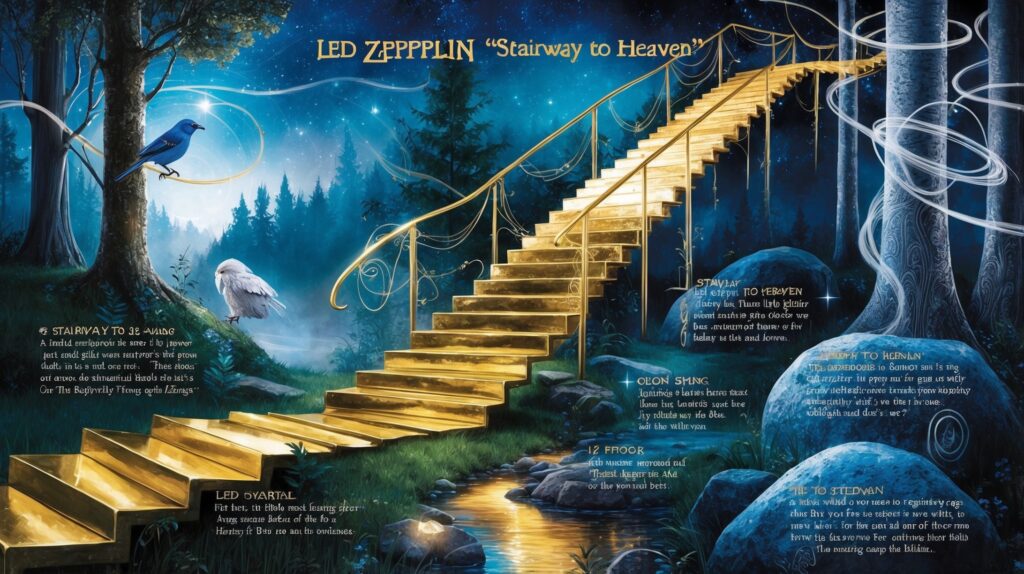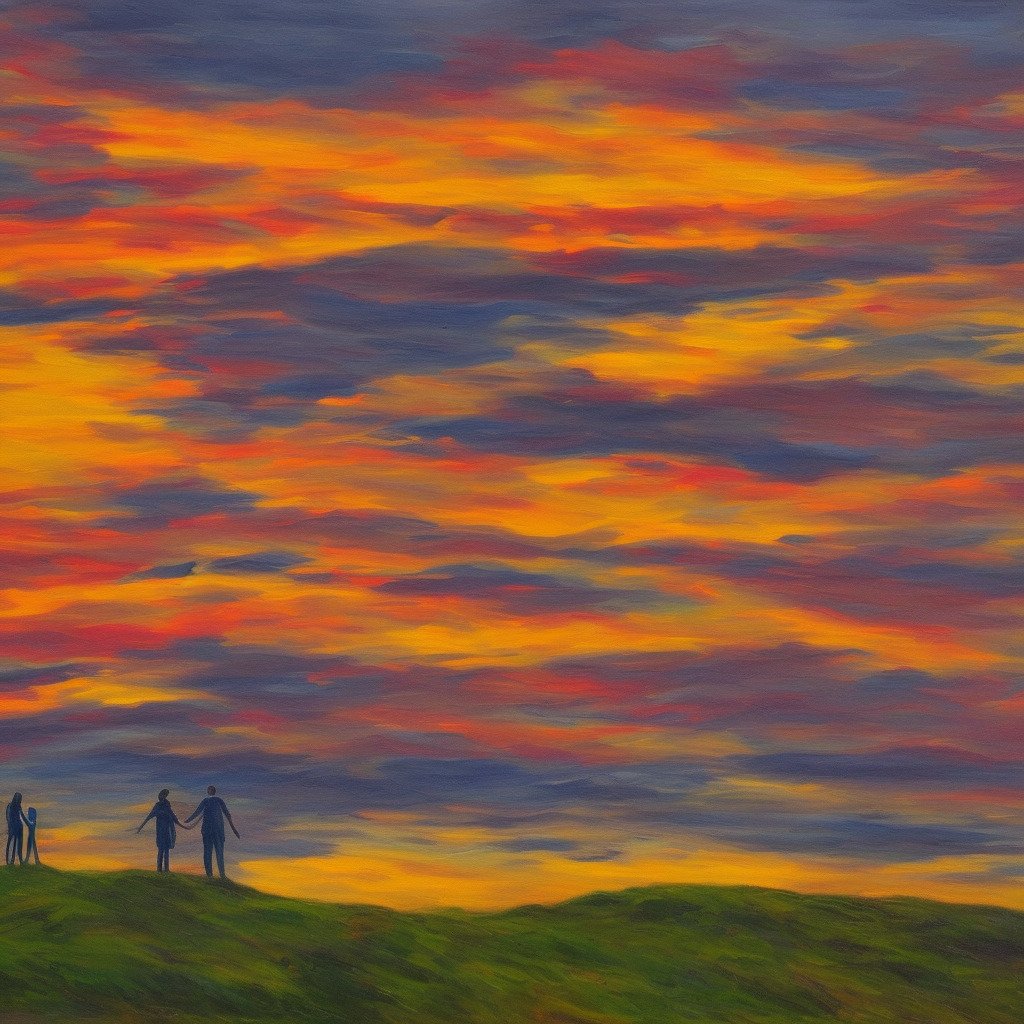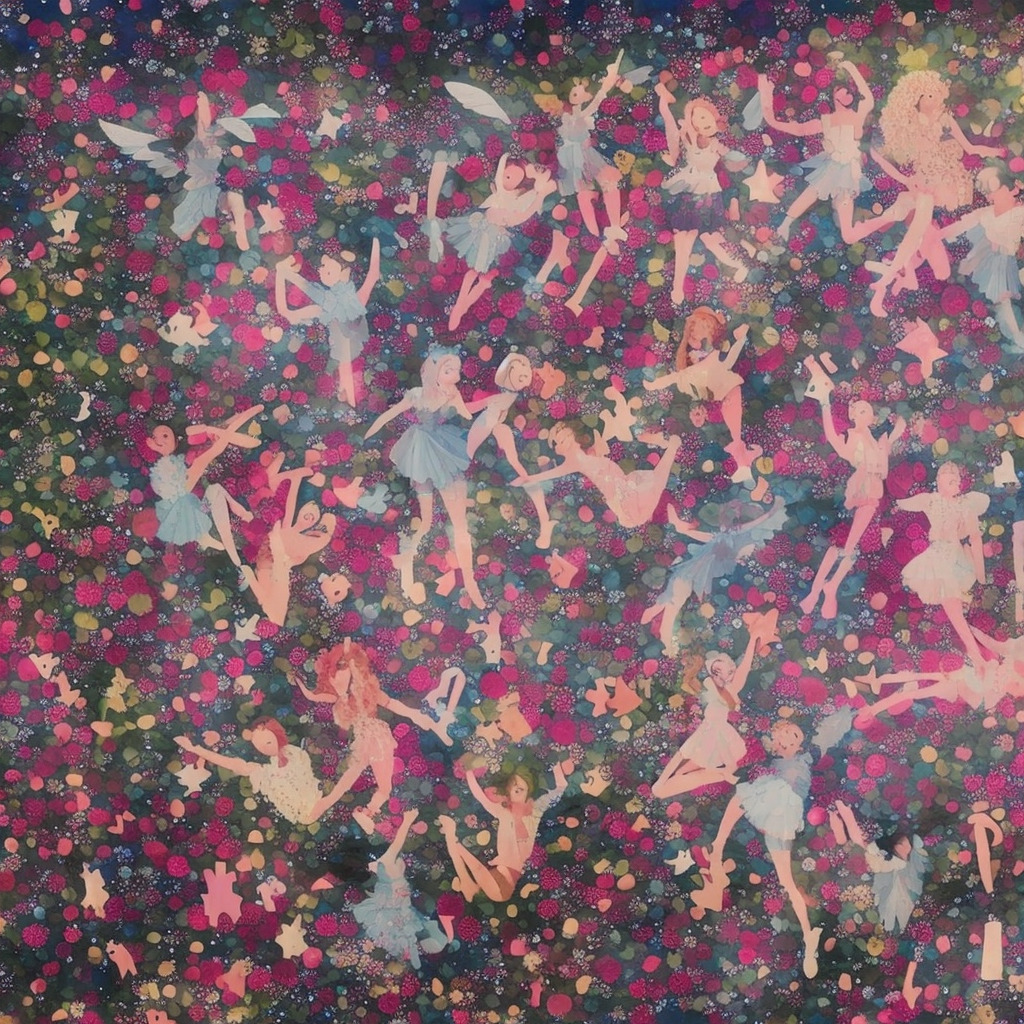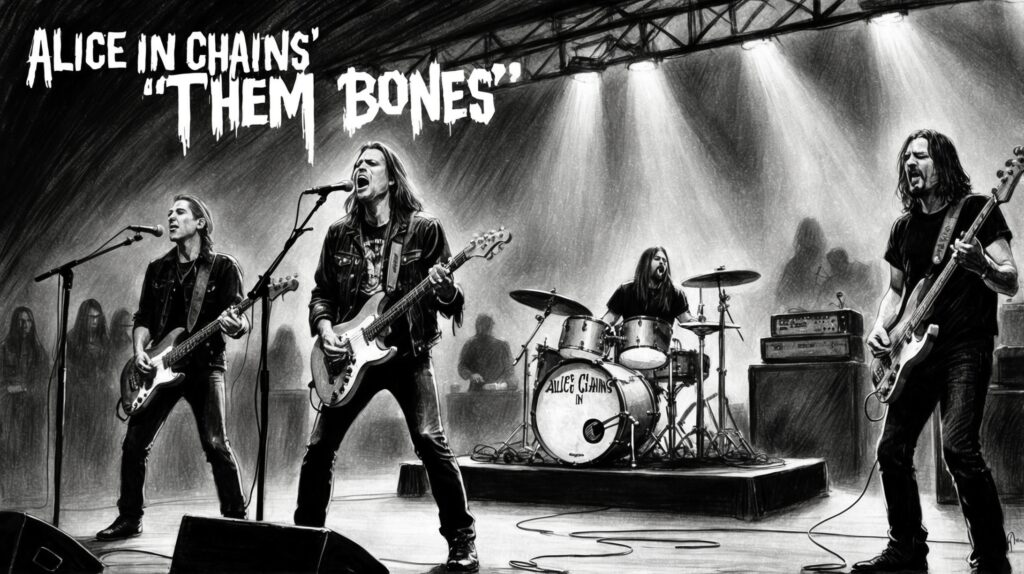Led Zeppelin | Stairway To Heaven
Led Zeppelin: Masters of Their Craft and Icons of Rock
Explore Led Zeppelin’s prolific journey during the creation of ‘Stairway to Heaven,’ delving into their rise in the rock scene and the collaborative synergy that defined their iconic sound.
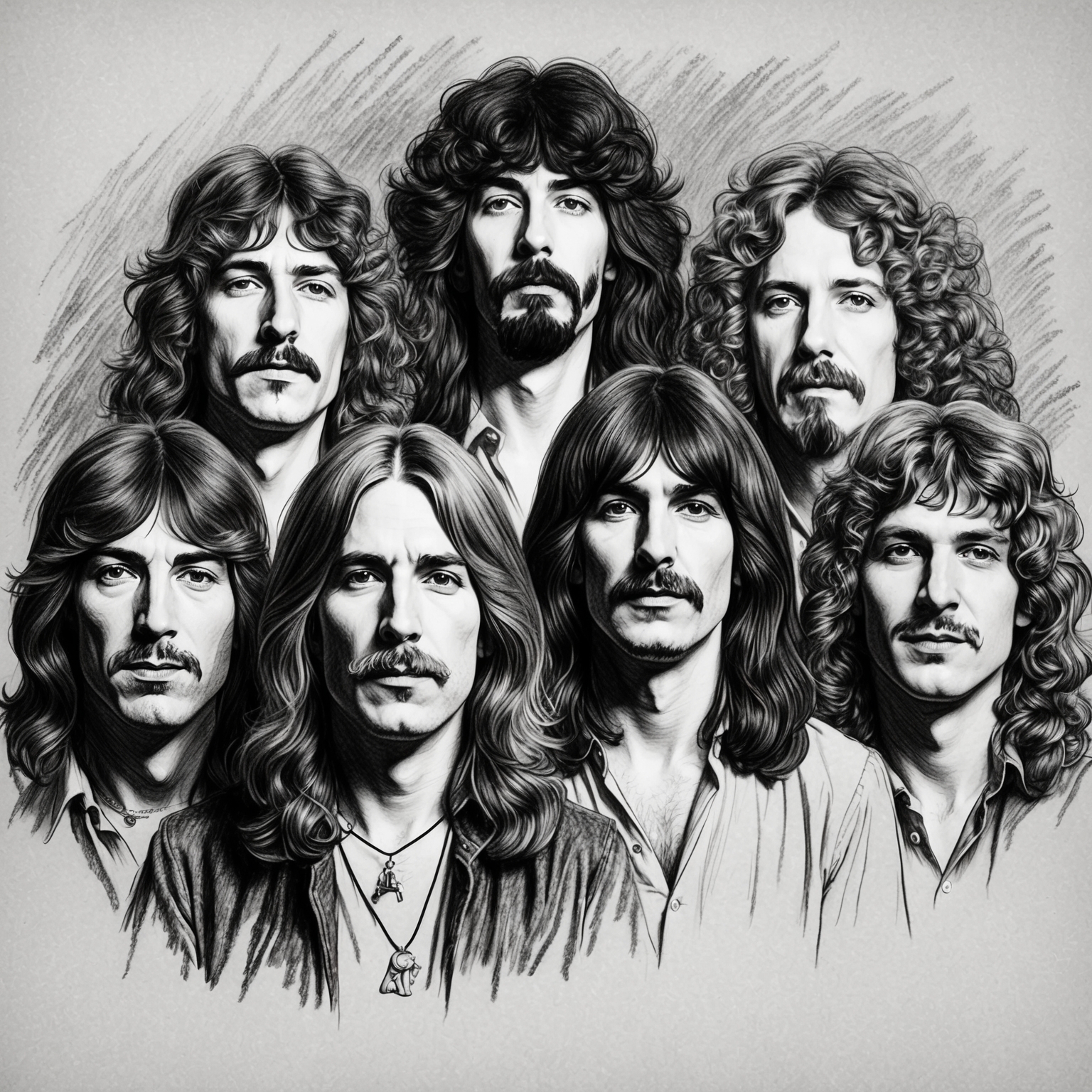
Led Zeppelin, one of the most celebrated rock bands of the 20th century, made an indelible mark on the music world with their enigmatic and multifaceted track, “Stairway to Heaven.” Emerging in the late 1960s, the British band swiftly ascended to stardom, riding the wave of their groundbreaking blend of blues, rock, and folk influences. With Robert Plant’s powerful vocals, Jimmy Page’s virtuoso guitar work, John Paul Jones’ innovative bass and keyboard skills, and John Bonham’s thunderous drumming, the group’s talent was undeniable. “Stairway to Heaven,” a track from their fourth studio album, became a testament to their artistry, showcasing the band’s prowess and creativity.
The era during which Led Zeppelin released “Stairway to Heaven” was marked by a cultural shift where rock music was evolving, becoming more intricate and expressive. Before forming Led Zeppelin, Jimmy Page was honing his craft as a session musician, while Robert Plant and John Bonham were deeply involved in the British blues scene. Once assembled, the band members tapped into their diverse experiences, creating a sound that pushed the boundaries of rock music. The magnificent synergy among the group enabled them to experiment with new styles and sounds, leading to their magnum opus, “Stairway to Heaven.”
The creation of “Stairway to Heaven” came at a time when the band was pondering the future direction of their music. The creative process behind the song was a collaborative effort, with Page penning the instrumental composition and Plant crafting the lyrics. Page noted the importance of allowing the song to develop naturally, embodying a flow that progressed from folk-inspired beginnings to a hard-hitting guitar-heavy crescendo. Upon its release, the track’s success further solidified Led Zeppelin’s status as musical innovators, influencing countless artists and leaving a lasting legacy in the annals of rock history.
The Genius Behind the Notes: Jimmy Page
Jimmy Page, the composer of ‘Stairway to Heaven,’ is a legendary figure in rock music, known for his innovative style and profound influences. His role in crafting the song’s intricate structure and blending diverse musical elements highlights his genius, leaving a lasting legacy.
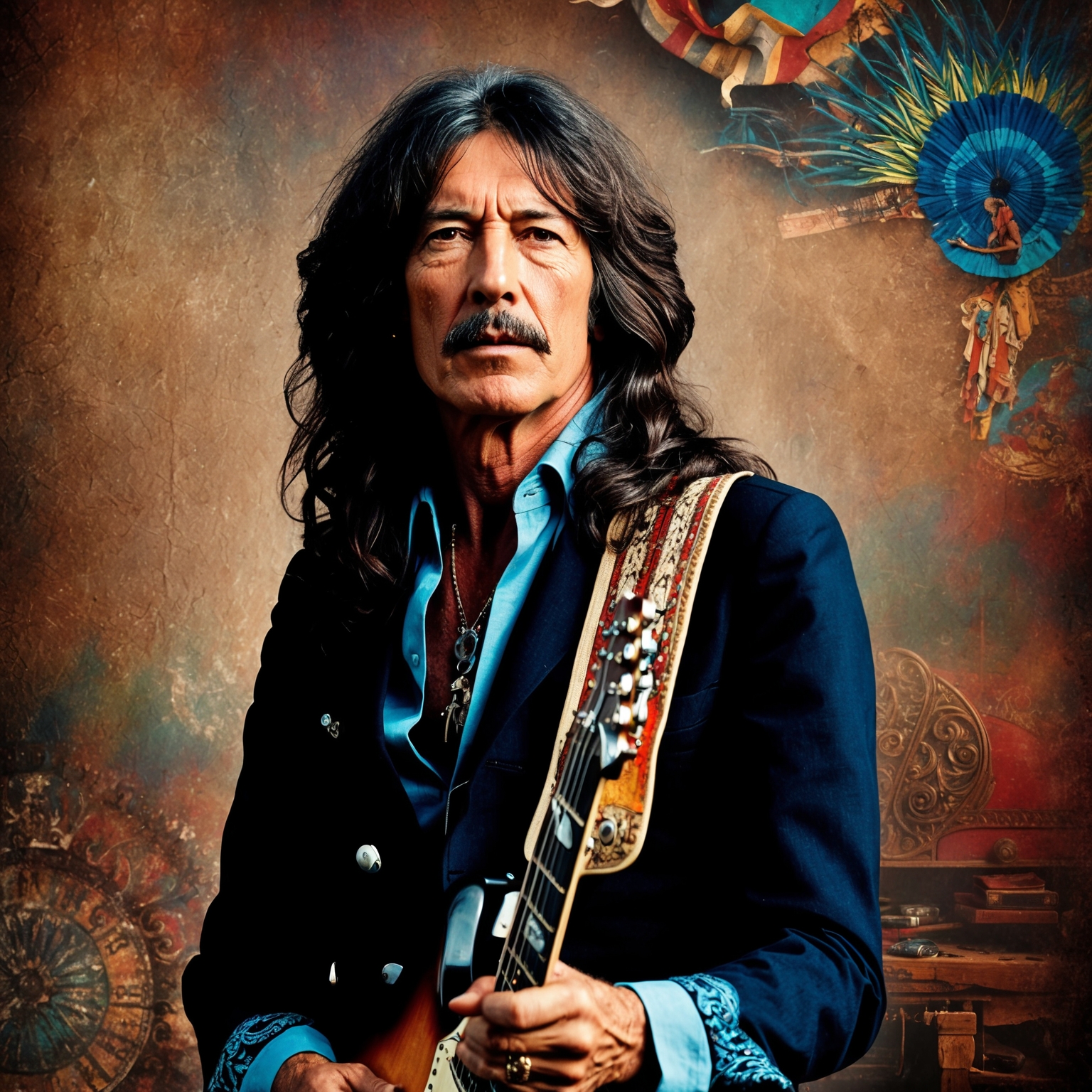
Background and Career: Jimmy Page, the mastermind behind many of Led Zeppelin’s greatest hits, is often hailed as one of the most influential guitarists and composers in rock music. Born in 1944 in Heston, England, Page’s journey into the realm of music began at a tender age with a second-hand guitar. His early career was marked by an impressive stint as a session musician, where he honed his skills and developed a signature style that would later resonate through his contributions to Led Zeppelin. By the time he co-founded the band in 1968, Page had already established himself as a formidable force in the industry, driven by an insatiable creative energy.
Musical Style and Influences: Page’s musical style is a tapestry woven with threads of blues, folk, and psychedelia, creating a soundscape that is uniquely his own. Heavily influenced by early blues legends like B.B. King and Muddy Waters, Page brought a deep, soulful quality to his compositions. His love for Eastern music, coupled with his innovative guitar techniques such as bowing the guitar strings, added a mystical dimension to his work. This amalgamation of influences is vividly showcased in “Stairway to Heaven,” where Page’s masterful blending of gentle acoustics and explosive electrics embodies an epic journey.
Role in the Song’s Creation: As the principal architect of “Stairway to Heaven,” Page’s role was instrumental in crafting the song’s intricate structure and progressive build-up. His vision for the track was to create a musical journey that ebbed and flowed, mirroring an ascent to a metaphorical heaven. Page meticulously layered each section, moving from haunting finger-picked passages to a bluesy midsection and a climactic hard rock finale. His composition played a pivotal role in the song’s enduring legacy, with its seamless transitions and evocative melodies leaving an indelible mark.
Legacy and Influence: Jimmy Page’s legacy as a composer extends far beyond “Stairway to Heaven.” Regarded as an innovator in both acoustic and electric guitar realms, his work has influenced countless musicians and bands across generations. His contributions to the rock genre have become a blueprint for many aspiring artists, ensuring that his influence is felt worldwide. Whether through his impeccable guitar work or his visionary compositions, Page has solidified his place as a cornerstone of rock history.
The Legacy of Recognition and Tribute
The enduring legacy of ‘Stairway To Heaven’ lies not only in its critical acclaim but also in the breadth of tributes and covers it has inspired, solidifying its place in pop culture.

Stairway To Heaven by Led Zeppelin stands as a monumental piece of rock history, not just for its remarkable composition but also for the plethora of accolades and tributes it has inspired over the years. Despite the lack of formal awards upon its initial release in 1971—owing in part to its release as an album track on Led Zeppelin IV rather than a single—the song’s influence and legacy have only grown over time. It has garnered critical acclaim across various platforms, being frequently ranked near the top of greatest songs of all time by music magazines and critics alike. Its timeless appeal is evidenced by its continuous airplay on classic rock stations and its perennial presence in discussions about the greatest rock songs ever penned.
Adding to its prestigious acclaim are the numerous covers by a diverse array of artists. One of the most notable covers comes from Heart, whose rendition at the 2012 Kennedy Center Honors paying tribute to Led Zeppelin was a powerful and emotional performance, demonstrating the song’s reach and influence across generations. Artists such as Dolly Parton and Foo Fighters have also put their unique spins on the song, showcasing its versatility and universal appeal. These covers underscore the song’s ability to transcend its original rock genre, adapting seamlessly across various musical styles while maintaining its core ethos.
Beyond its covers, Stairway To Heaven has made appearances in numerous media contexts, solidifying its place in pop culture. While the song itself has not been featured extensively in film due to rights issues, its unmistakable notes are often associated with images of grandeur and mystery. It is frequently referenced, parodied, and celebrated in movies and TV shows, from Wayne’s World to The Simpsons, affirming its ubiquitous presence in popular media. This continuous homage is a testament to the song’s enduring impact and its role as a hallmark of rock music’s golden era.
The Unanticipated Journey to Chart Success
“Stairway to Heaven” defied traditional chart success through immense airplay and cultural impact without a single release, making it a cornerstone of Led Zeppelin’s legendary career.

When Led Zeppelin released “Stairway to Heaven” in 1971 as part of their fourth studio album, Led Zeppelin IV, few could anticipate the enduring impact it would have on the music industry. Surprisingly, the song was never released as a single, which made its journey to chart success rather unique. Despite this, it still managed to become one of the most played tracks on FM radio stations in the 1970s, indicating a level of popularity that defied traditional chart metrics.
The song’s release experienced a subtle yet powerful impact. Due to the absence of a traditional single release, “Stairway to Heaven” did not initially chart like other mainstream hits of the time. Nevertheless, its extended airplay and demand among listeners helped propel Led Zeppelin’s fourth album to staggering commercial success. Led Zeppelin IV ultimately became one of the best-selling albums of all time, a stunning achievement that underscored the song’s pivotal role in the band’s career.
As the song garnered attention, its reception among fans and critics was overwhelmingly positive. Critics praised its progressive musical structure and evocative lyrics, while audiences embraced its mystical aura. Over the years, “Stairway to Heaven” has maintained its influential status, continuing to appear in various “greatest songs of all time” lists, thereby solidifying its position as a cultural touchstone. Its resonance with listeners across different generations keeps it relevant, ensuring its legacy endures.
Despite not having a traditional promotion strategy or single release, the magnetism of “Stairway to Heaven” enabled it to achieve monumental status. Today, its success isn’t measured by initial chart positions but by its lasting impact and timeless legacy.
Exploring the Visual Journey of ‘Stairway to Heaven’
Discover the visual representations of Led Zeppelin’s ‘Stairway to Heaven’ through live performances and fan-created videos, exploring how they capture the song’s mystical essence.

While ‘Stairway to Heaven’ by Led Zeppelin does not have an official music video in the traditional sense, its legacy has been visually represented through numerous live performances and fan-created videos that capture the essence of this iconic track. The song, released in 1971, predates the dominance of music videos on platforms like MTV, which emerged later in the decade. Therefore, the absence of a music video did not impede its success but rather contributed to its mysterious allure, allowing listeners to interpret and visualize the song’s themes in their own personal way.
The significance of ‘Stairway to Heaven’ in Led Zeppelin concerts, especially the live rendition captured in ‘The Song Remains the Same’ concert film, serves as a pseudo-music video for many fans. Jimmy Page’s mesmerizing guitar solos, coupled with Robert Plant’s enigmatic stage presence, creates an immersive experience that embodies the mythic and ethereal themes expressed in the lyrics. These live performances often included dynamic lighting and visuals, enhancing the spiritual and mystical journey the song takes you on.
Fans of Led Zeppelin have also taken it upon themselves to create their own interpretations of ‘Stairway to Heaven’ through various unofficial music videos. These homemade videos range from intricate animation to cinematic storytelling, each version exploring different facets of the song, from its introspective verses to its climactic oneiric crescendo. Critically, these fan contributions provide insight into the song’s pervasive influence on popular culture and its enduring power to inspire creativity across generations.
The Musical Blueprint of ‘Stairway to Heaven’
Stairway to Heaven’ by Led Zeppelin is an ingeniously structured song blending folk, classical, and rock elements with significant tempo changes, evolving from meditative balladry to an explosive guitar-driven finale. Crafted in A Minor, it marks a key point in the band’s stylistic evolution.

A masterpiece of rock architecture, the structure of ‘Stairway to Heaven‘ exemplifies the innovative spirit of Led Zeppelin. Written in A Minor, the song showcases an unusual hybrid structure merging classical, folk, and hard rock elements. Starting with a haunting acoustic guitar intro featuring fingerpicked arpeggios, the initial section remains within a calm A Minor atmosphere enhanced by a gentle recorder melody, evoking a medieval or folk feel before it gradually escalates. This soothing beginning eventually gives way to the song’s iconic hard rock crescendo, where Robert Plant’s soulful vocals and Jimmy Page’s impressive guitar work take center stage in a passionate climax. The song beautifully matures from a reflective ballad to rock dynamism, weaving through more than one distinct tempo and mood.
The chord progression in ‘Stairway to Heaven‘ cleverly reinvents traditional sequences, beginning with softer, folk-inspired harmonies, and gradually introducing rock-driven power chords in its latter parts. The transition to a faster tempo is crafted through a strategic increase in tempo and intensity, with John Bonham’s drums and John Paul Jones’s bass work adding sustained energy and maintaining the song’s rhythmic balance. Somewhat uniquely, the latter section drops the earlier subtle acoustic foundation in favor of an electrified sound that showcases Jimmy Page’s guitar wizardry, contributing significantly to the song’s compelling aural journey.
Alongside its complex melodic shifts, ‘Stairway to Heaven‘ stands out due to its intricate instrumentation. Each member of the band contributed distinct sonic textures, with the gentle introduction of acoustic guitar and recorders, gradually joined by electric guitar, drums, and bass which transform the song into a hard rock anthem. The juxtaposition of these instruments, alongside Plant’s dynamic vocal range—from gentle storytelling to fervent cries—creates a multifaceted soundscape that remains unparalleled.
Comparatively, ‘Stairway to Heaven‘ sits at a pivotal point in Led Zeppelin’s discography. While their earlier work emphasized raw blues-rock vigor, this song is emblematic of their maturity and experimental edge. It showcases a sophisticated marriage of lyrical depth, thematic innovation, and musical exploration that laid groundwork for their subsequent, more expansive works.
Adding to the mystique are tales from the recording sessions at the legendary Basing Street Studios in London. With engineer Andy Johns at the helm, Jimmy Page fine-tuned his solo until achieving the haunting, soaring perfection that is now considered one of rock’s defining moments. The legendary album ‘Led Zeppelin IV’, which houses the track, benefited from the band’s unified vision and production prowess, further cementing ‘Stairway to Heaven’ as an evergreen classic in the pantheon of rock.
Unveiling Layers of Symbolism in ‘Stairway to Heaven’
Explore the intricate and mystical lyrics of ‘Stairway to Heaven’, uncovering themes of materialism, spirituality, and personal quest for meaning through rich literary devices.
And she’s buying a stairway to heaven
When she gets there she knows
If the stores are all closed
With a word, she can get what she came forOoh-ooh-ooh, ooh-ooh-ooh
And she’s buying a stairway to heavenThere’s a sign on the wall, but she wants to be sure
‘Cause you know, sometimes words have two meanings
In a tree by the brook, there’s a songbird who sings
Sometimes all of our thoughts are misgiven
Ooh, it makes me wonder
Ooh, it makes me wonder
There’s a feeling I get when I look to the west
And my spirit is crying for leaving
In my thoughts, I have seen rings of smoke through the trees
…
******* This Lyrics is NOT for Commercial use *******
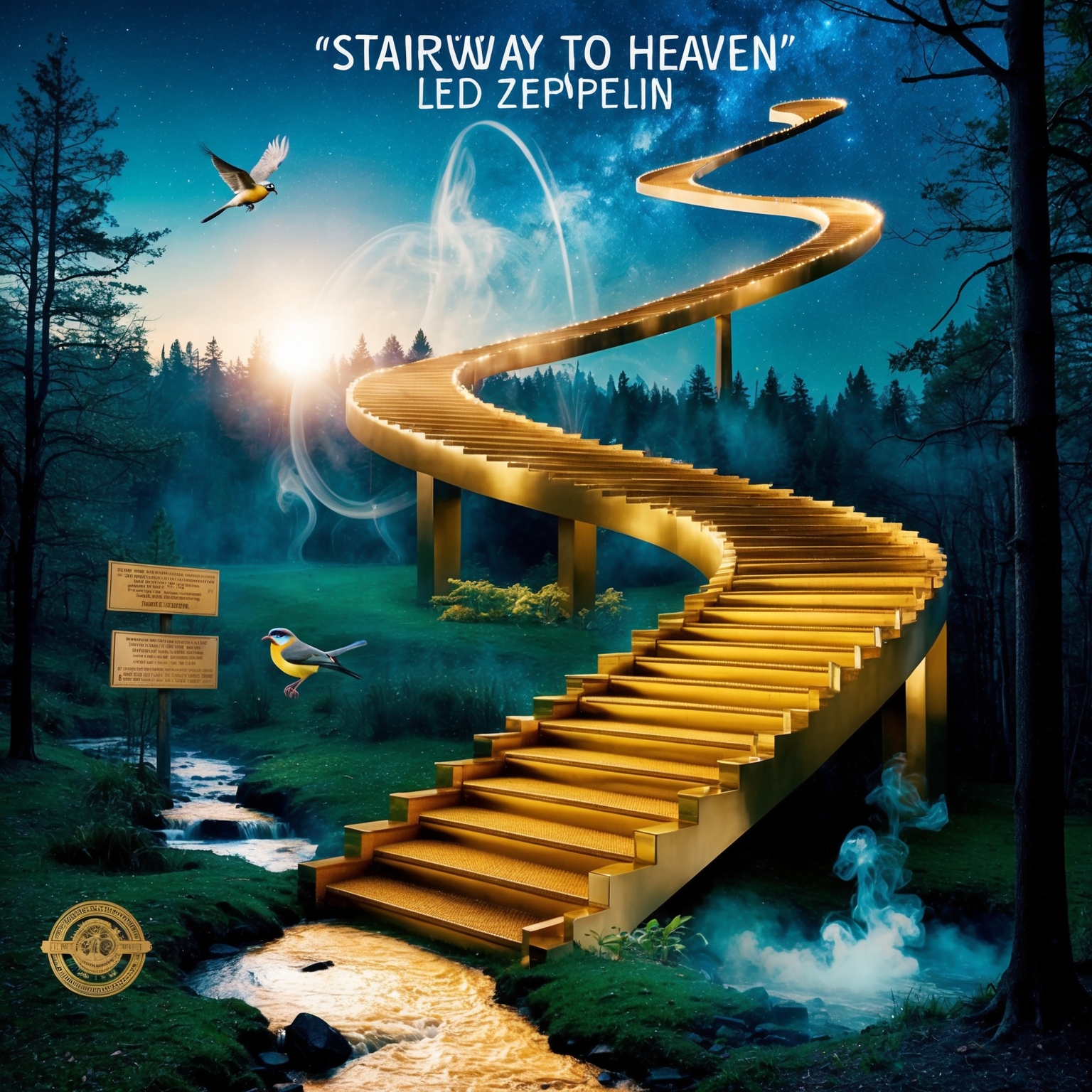 Led Zeppelin’s “Stairway to Heaven” stands as an enigmatic piece in the panorama of rock music, offering listeners an intricate tapestry of lyrical depth and poetic mysticism.
Led Zeppelin’s “Stairway to Heaven” stands as an enigmatic piece in the panorama of rock music, offering listeners an intricate tapestry of lyrical depth and poetic mysticism.
Lyrical Themes and Messages: At its core, the song explores themes of materialism, spirituality, and existential inquiry. The recurring motif of a lady “buying a stairway to heaven” may be interpreted as a critique of those who seek spiritual enlightenment through material wealth. Such themes resonated deeply with audiences during the early 1970s—a time when Western societies were grappling with the consequences of consumer culture.
Narrative and Storytelling: The lyrics unfold a dreamlike narrative, oscillating between the tangible and the metaphysical. Written from a third-person perspective, listeners are guided through vivid imagery that evokes a sense of wonder and introspection. This narrative style invites the audience to embark on a personal quest for meaning alongside the song’s characters, amplifying the song’s emotional impact.
Use of Literary Devices: Jimmy Page and Robert Plant skillfully employ a plethora of literary devices, including metaphors like “all that glitters is gold” and potent imagery, such as “rings of smoke through the trees.” These elements not only enrich the song’s lyrical quality but also enhance its ability to evoke introspection and emotion. The use of ambiguous language encourages multiple interpretations, further solidifying the song’s timeless allure.
Controversies and Misinterpretations: Over the years, “Stairway to Heaven” has been subject to various controversies and misinterpretations. Some listeners have speculated the presence of hidden messages or commentary on spiritual paths, while others have proposed alternative meanings based on personal experiences. These differing viewpoints contribute to the song’s enduring intrigue and popularity.
Personal Reflections of the Artist: Robert Plant, when asked about the song’s meaning, has often maintained its ambiguity, suggesting that the lyrics were intended to inspire and provoke thought rather than dictate a clear message. This openness to interpretation invites listeners to explore their own connections and insights, granting the song its timeless appeal.
Did you know Stairway to Heaven was never released as a single, yet became a rock anthem? 🎸 Its magical journey started in 1971! #LedZeppelin #RockLegends #MusicTrivia https://bit.ly/3NBkM7j
Click to Tweet

